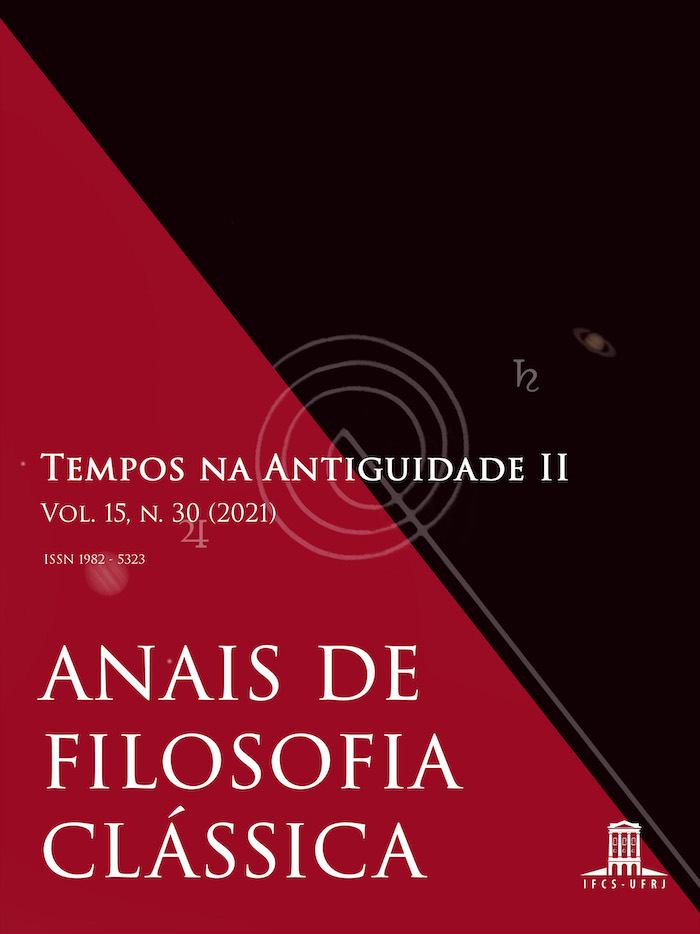A definição aristotélica do tempo incorre em uma transgressão de gênero?
DOI:
https://doi.org/10.47661/afcl.v15i30.46031Palavras-chave:
Aristóteles, Tempo, Problema da Transgressão de Gênero, Filosofia da CiênciaResumo
O presente trabalho expõe uma leitura da definição aristotélica do tempo em Física IV. 11, 219b1-2, explicitando a sua compatibilidade com a tese intitulada de ‘proibição da transgressão de gênero’ presente em Segundos Analíticos I. 7, 75a38-39. A interpretação tradicional propõe que a tese aristotélica da transgressão de gênero impossibilita a utilização de atributos de um domínio científico em outras ciências. Se esse for o caso, a definição aristotélica incorreria em uma transgressão, visto que ‘número’ é um item da aritmética e não poderia ser utilizado em um objeto da ciência natural, como o tempo. Mostro uma leitura da transgressão de gênero à luz da teoria da proporção que torne compatível a definição do tempo com a tese da transgressão de gênero.Downloads
Referências
ACKRILL, J. Aristotle, Categories and De Interpretatione. Clarendon Press, 1975.
ANGIONI, L. Aristóteles: Segundos Analíticos, Livro I. Campinas: IFCH/UNICAMP, 2004.
ANGIONI, L. Geometrical premises in Aristotle’s Incessu Animalium and kind-crossing. ANAIS DE FILOSOFIA CLÁSSICA, vol. 12 nº 24, p. 53-71, 2018.
BARNES, J. Aristotle, Posterior Analytics. Clarendon Press, 2ª edição, 1993.
COOPE, U. Why Does Aristotle Say That There Is No Time Without Change?. Proceedings of the Aristotelian Society, 101(1): 359–367, 2001.
EUCLIDES. Euclidis Elementa. Leipzig: B. G. Teubner. Editado por E. S Stamatis, J. L. Heiberg, 1969.
HASPER, P. S. Sources of delusion in Analytica Posteriora I 5. Phronesis 51, p. 252-284, 2006.
HEATH, T. The Thirteen Books of the Elements, Vol. 2. Cambridge University Press, 1908.
HUSSEY, E. Aristotle's Physics III & IV. Trans. and commentary. Clarendon Aristotle Series. Oxford: Oxford University Press, 1983.
KNORR, W. What Euclid Meant: On the Use of Evidence in Studying Ancient Mathematics. Science and Philosophy in Classical Greece, p. 119-163, 1991.
MENDELL, H. Two Traces of Two-Step Eudoxan Proportion Theory in Aristotle: a Tale of Definitions in Aristotle, with a Moral. Archive for History of the Exact Sciences, 61: 3-37, 2007.
MENDELL, H. Aristotle and Mathematics, Stanford Encyclopedia of Philosophy (http://plato.stanford.edu/entries/aristotle-mathematics/), 2019.
ROSS, W. Aristotle's Prior and Posterior Analytics: A Revised Text with Introduction and Commentary. Oxford University Press, 1964.
STEINKRÜGER, P. Aristotle on Kind-Crossing. Oxford Studies in Ancient Philosophy 54, p. 107-158, 2018.


